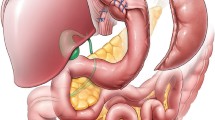Abstract
The last two decades have seen remarkable advances in and acceptance of bariatric surgery. These advances include quality assurance, certification of surgeons and their institutions and the development of national bariatric registries. Yet, in spite of these advances, an urgent need to improve ethical standards in bariatric surgery remains. In particular, surgical innovation must be subjected to adequate scrutiny and sufficient safeguards. New procedures and the processes by which they are assessed should be subject to review and approval by the ethics committees operating under clearly defined guidelines. The public must be able to have confidence that the surgery itself, and the innovative practices that are introduced within it, are not subject to distortions associated with personal, wider professional, industry or institutional interests.
Similar content being viewed by others
References
Effects of weight loss and sodium reduction intervention on blood pressure and hypertension incidence in overweight people with high-normal blood pressure. The Trials of Hypertension Prevention, phase II. The Trials of Hypertension Prevention Collaborative Research Group. Arch Intern Med. 1997;157(6):657-67.
Tretbar LL, Taylor TL, Sifers EC. Weight reduction. Gastric plication for morbid obesity. J Kans Med Soc. 1976;77:488–90.
Talebpour M, Amoli BS. Laparoscopic total gastric vertical plication in morbid obesity. J Laparoendosc Adv Surg Tech A. 2007;17:793–8.
Ramos A, Galvao Neto M, Galvao M, et al. Laparoscopic greater curvature plication: initial results of an alternative restrictive bariatric procedure. Obes Surg. 2010;20:913–8.
Abdelbaki TN, Huang CK, Ramos A, et al. Gastric plication for morbid obesity: a systematic. Obes Surg. 2012;22:1633–9.
ASMBS policy statement on gastric plication. Surg Obes Relat Dis 2011;7:262
Huang CK, Lo CH, Shabbir A, et al. Novel bariatric technology: laparoscopic adjustable gastric banded plication: technique and preliminary results. Surg Obes Relat Dis. 2012;8:41–5.
OSSANZ. Sleeve plication, http://www.ossanz.com.au/surgery_sleeve_plication.htm. Accessed 28 March 2013.
Hii MW, Clarke NE, Hopkins GH. Gastrogastric herniation: an unusual complication following greater curve plication for the treatment of morbid obesity. Ann R Coll Surg Engl. 2012;94:e76–8.
Angelos P. The ethical challenges of surgical innovation for patient care. Lancet. 2010;376:1046–7.
McKneally MF, Daar AS. Introducing new technologies: protecting subjects of surgical innovation and research. World J Surg. 2003;27:930–4. discussion 934–935.
Guarner V. Improvising, innovating and experimenting in surgery. A serious problem without ethical regulation in current surgical practices. Gac Med Mex. 2008;144:445–8.
Johnson J, Rogers W. Innovative surgery: the ethical challenges. J Med Ethics. 2012;38:9–12.
Reitsma AM, Moreno JD. Ethical regulations for innovative surgery: the last frontier? J Am Coll Surg. 2002;194:792–801.
Williams NS, Bulstrode CJK, O’Connell PR. Bailey and Love’s short practice of surgery revised. Taylor & Francis Ltd: Ed. London. GB; 2012.
Kaminski D, Herrmann V, Martin S. Late effects of jujunoileal bypass operations on fibrosis and lipid content. Hepato-Gastroenterology. 1985;32(4):159–62.
O’Brien PE, Macdonald L, Anderson M, et al. Long-term outcomes after bariatric surgery: fifteen-year follow-up of adjustable gastric banding and a systematic review of the bariatric surgical literature. Ann Surg. 2013;257:87–94.
Sjöström L. Review of the key results from the Swedish Obese Subjects (SOS) trial—a prospective controlled intervention study of bariatric surgery. J Intern Med. 2013;273(3):219–34.
Dixon JB, Straznicky NE. Lambert EA, et al. Nat Rev Gastroenterol Hepatol: Surgical approaches to the treatment of obesity; 2011.
Mastroianni AC. Liability, regulation and policy in surgical innovation: the cutting edge of research and therapy. Health Matrix Clevel. 2006;16:351–442.
Dixon BJ, Daly MJ, Chan H, et al. Surgeons blinded by enhanced navigation: the effect of augmented reality on attention. Surg Endosc. 2013;27:454–61.
Fourman MM, Saber AA. Robotic bariatric surgery: a systematic review. Surg Obes Relat Dis. 2012;8:483–8.
WMC. World Medical Society. Declaration of Helsinki (modified 2008 by the WMS general assembly, Seoul, South Korea). 2008.
Stroh C, Birk D, Flade-Kuthe R, et al. A nationwide survey on bariatric surgery in Germany—results 2005–2007. Obes Surg. 2009;19:105–12.
Melissas J. IFSO guidelines for safety, quality, and excellence in bariatric surgery. Obes Surg. 2008;18:497–500.
Welbourn R, Fiennes A, Kinsman R, et al. The United Kingdom Bariatric Surgery Registry: first registry report to March 2010. Oxfordshire UK: Dendritic Clinical Systems Ltd; 2011.
Birkmeyer NJ, Dimick JB, Share D, et al. Hospital complication rates with bariatric surgery in Michigan. JAMA. 2010;304:435–42.
Shikora SA. A call for maintaining ethical behavior in bariatric surgery. Obes Surg. 2012;22:849–50.
Conflict of Interest
Prof. John Dixon acts as a consultant for Allergan Inc., and Metagenics Inc.; is a member of the Optifast Medical Advisory Board for Nestle Australia; has received honoraria from iNova Pharmaceuticals and research grants from Allergan Inc. None of these entities had any input in the current review. Dr. Logue and Professor Komesaroff have no relevant disclosures.
Funding
Prof. Dixon is supported by a Senior Research Fellowship from the National Health & Medical Research Council of Australia. The authors did not receive any external funding for the preparation of this review.
Author information
Authors and Affiliations
Corresponding author
Rights and permissions
About this article
Cite this article
Dixon, J.B., Logue, J. & Komesaroff, P.A. Promises and Ethical Pitfalls of Surgical Innovation: the Case of Bariatric Surgery. OBES SURG 23, 1698–1702 (2013). https://doi.org/10.1007/s11695-013-1049-1
Published:
Issue Date:
DOI: https://doi.org/10.1007/s11695-013-1049-1




